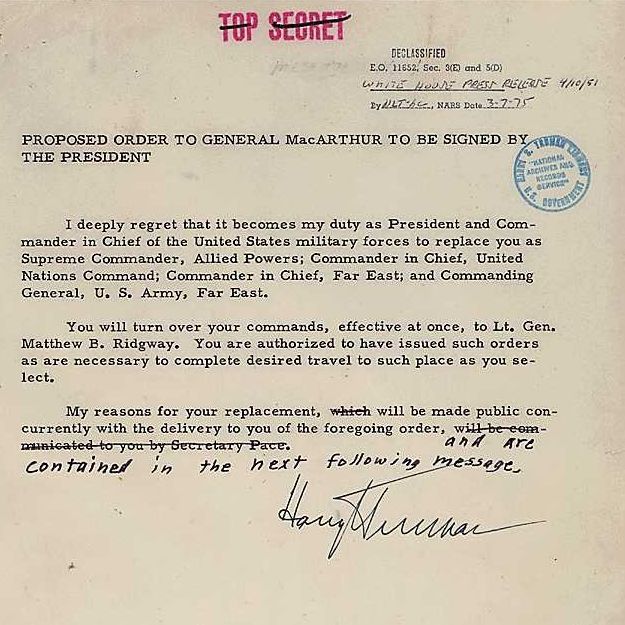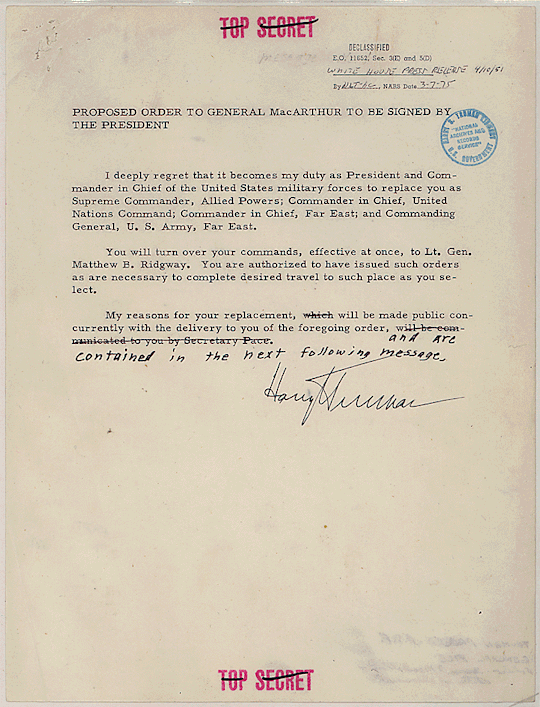射天狼
天弓 神箭
曆史顯示
杜魯門 是位有思考的果敢的政治家, 有勇氣,有決斷, 有擔當。
麥克阿瑟 是位純軍事而無大局的司令官。
解除麥克阿瑟的軍職,不是 杜魯門一人的心血來潮茫然決定, 參謀長聯席會議,陸海空三軍的主帥,都支持總統總司令的決定, 也可以說,是三軍參謀長的決定由總統來宣布下達和執行。
麥克阿瑟 認為中國和軍隊不堪一擊,主張戰火連中國 一起燒, 杜魯門和他的參謀長們,認為要打一次 有限戰爭,不要挑起第三次世界大戰。而且 麥克阿瑟 幾次公開批評杜魯門總統的國際政策和方針。這惹惱了本來就對麥克阿瑟不感冒的 總統 杜魯門。
A dispute between President Harry S. Truman and General Douglas MacArthur in 1951, during the Korean War. MacArthur, who commanded the troops of the United Nations, wanted to use American air power to attack the People's Republic of China.
The President, suspecting MacArthur might see that his days were numbered and resign before he could act, moved quickly, announcing the dismissal at 1 a.m. on April 11, 1951:
“With deep regret, I have concluded that General of the Army Douglas MacArthur is unable to give his wholehearted support to the policies of the United States Government . . . military commanders must be governed by the policies and directives issued to them in the manner provided by our laws and Constitution. . . . General MacArthur’s place in history as one of our greatest commanders is fully established.”

杜魯門簽署的 解職命令原文



- 1951
President Truman relieves General MacArthur of duties in Korea
In perhaps the most famous civilian-military confrontation in the history of the United States, President Harry S. Truman relieves General Douglas MacArthur of command of the U.S. forces in Korea. The firing of MacArthur set off a brief uproar among the American public, but Truman remained committed to keeping the conflict in Korea a “limited war.”
Problems with the flamboyant and egotistical General MacArthur had been brewing for months. In the early days of the war in Korea (which began in June 1950), the general had devised some brilliant strategies and military maneuvers that helped save South Korea from falling to the invading forces of communist North Korea. As U.S. and United Nations forces turned the tide of battle in Korea, MacArthur argued for a policy of pushing into North Korea to completely defeat the communist forces. Truman went along with this plan, but worried that the communist government of the People’s Republic of China might take the invasion as a hostile act and intervene in the conflict. In October 1950, MacArthur met with Truman and assured him that the chances of a Chinese intervention were slim. Then, in November and December 1950, hundreds of thousands of Chinese troops crossed into North Korea and flung themselves against the American lines, driving the U.S. troops back into South Korea. MacArthur then asked for permission to bomb communist China and use Nationalist Chinese forces from Taiwan against the People’s Republic of China. Truman flatly refused these requests and a very public argument began to develop between the two men.
In April 1951, President Truman fired MacArthur and replaced him with Gen. Matthew Ridgeway. On April 11, Truman addressed the nation and explained his actions. He began by defending his overall policy in Korea, declaring, “It is right for us to be in Korea.” He excoriated the “communists in the Kremlin [who] are engaged in a monstrous conspiracy to stamp out freedom all over the world.” Nevertheless, he explained, it “would be wrong—tragically wrong—for us to take the initiative in extending the war… Our aim is to avoid the spread of the conflict.” The president continued, “I believe that we must try to limit the war to Korea for these vital reasons: To make sure that the precious lives of our fighting men are not wasted; to see that the security of our country and the free world is not needlessly jeopardized; and to prevent a third world war.” General MacArthur had been fired “so that there would be no doubt or confusion as to the real purpose and aim of our policy.”
MacArthur returned to the United States to a hero’s welcome. Parades were held in his honor, and he was asked to speak before Congress (where he gave his famous “Old soldiers never die, they just fade away” speech). Public opinion was strongly against Truman’s actions, but the president stuck to his decision without regret or apology. Eventually, MacArthur did “just fade away,” and the American people began to understand that his policies and recommendations might have led to a massively expanded war in Asia. Though the concept of a “limited war,” as opposed to the traditional American policy of unconditional victory, was new and initially unsettling to many Americans, the idea came to define the U.S. Cold War military strategy.
In 1985 Richard Nixon recalled discussing the atomic bombings of Hiroshima and Nagasaki with MacArthur:




